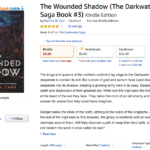You Are …
There was  a time when I actually believed … that as a critic I was an avenging angel with a flaming sword, and that part of my job was to help rid the culture of books that were sucking up more of the literary oxygen than they deserved. Lev Grossman, TIME book reviewer
a time when I actually believed … that as a critic I was an avenging angel with a flaming sword, and that part of my job was to help rid the culture of books that were sucking up more of the literary oxygen than they deserved. Lev Grossman, TIME book reviewer
Do not imagine yourself a caretaker of any tradition, an enforcer of any party standards, a warrior in an idealogical battle, a corrections officer of any kind. John Updike
As we examine, in this series, the work of reviewing, I would like to consider what a reviewer is, and just as importantly, what a reviewer is not.
If you are a reviewer, you are not an avenging angel; you’ve got no flaming sword to cut down books. No doubt there are books that deserve to be purged from the culture, but that’s not the work of a reviewer. It’s not really the work of anyone. Don’t make it your mission to shape a book’s fate. That is for readers to decide, and whatever influence you have should come on the wayside of your real goal, which is to review well and accurately.
You are not an enforcer of standards, because even if you could enforce any standards, they would only be your own, and there’s no reason one individual’s standards should be imposed on the literary world at large.
You are not a corrections officer, of authors or of books – or of the industry. Never review books with an eye toward changing or policing the genre to which those books belong. A book review is not a battleground for a war against the bad ideas, stupid cliches, or low quality of – well, fill in the blank: the romance genre, dystopian YA, Christian fiction …
You are not a warrior in an ideological battle – unless the author starts it, in the book under review. Any philosophy a book shows, any point or statement it makes is fair game; when a book enters the lists, feel free to sally forth to meet it. It is one of the glories of all books, even novels, to fight in the war of ideas. Just be sure you’re not dragging a book into an arena it doesn’t actually enter. We all have our convictions and our pet peeves, but it’s not fair to take them out on books that don’t explicitly cross them. And another thing to hold in mind: Lack of support should not be mistaken for an attack.
You are not the caretaker of any tradition – or the vanguard for any revolutionary cause. There are all sorts of literary traditions and causes, all backed up by honest conviction. Some are worthy, but probably none are worthy enough to be the yardstick by which all books are measured. Even if your cause is that worthy – the purpose of your book-reviewing should not be to fight for it. There’s nothing wrong with polemics, but a book review shouldn’t be one.
There is one principle behind all this, and that is simply to, as far as possible, take books exactly as they are, and review them only for what they are. Don’t pursue any other agenda. Just read a book, try to see it for what it is, and express what you see.
You are a reviewer.







































Thank you for this! A good lesson for even those of us who write an occasional book review on amazon, too.
You’re welcome! I’m glad you liked it.
Maybe I’m missing the full context of this series, but aren’t most reviews by readers? I mean, some people consider themselves “reviewers” as if it were a job or their website is devoted to providing reviews, and your article here seems almost more pointed at them than the average reader who writes a review.
The whole thing about not considering a review some kind of holy jihad against poor writing is well said and applicable to all. I just didn’t quite get the part about a reviewer just reviewing something for what it is. As if all we do is just hold up a mirror and state what the story is about.
The story blurb and description already does that, or should. Isn’t our job, as readers who are sharing what we think with other readers, to say what we liked or didn’t like? To share how the book made us feel and whether or not we enjoyed it?
Of course.
In my experience, all book blurbs fall short of capturing what the book really is, and some are actively misleading. (It may just be space-constraints.) I meant reviewing a book “for what it is” very broadly – a mystery, a romance, confusing, thrilling, fascinating, whatever you think of it.
Maybe it would have been better expressed by saying you should just review the book itself. My main point was simply to come without an agenda, and not to unjustly turn a review into a battleground for some ongoing literary or cultural war.
I suppose my article is more pointed to people who are active reviewers, and identified as such. It wasn’t by design, though. I wasn’t thinking of reviewers in categories. When you review a book, you’re a reviewer, and the principles of good reviewing are always the same.
Thanks for your points. Hopefully I’ve succeeded in clarifying what I wrote.
Thanks, Shannon! Yes, that clarified it.
A good reviewer should also be willing! As a new author, I have never been more aware of how much a review means to both author and potential reader. I vow to leave more reviews in the future and to put more effort into them. Regardless of reader response, they are oh so valuable! They can encourage … or, if mediocre, challenge and inspire. (And a bit of constructive criticism, if worded kindly, doesn’t necessarily make you a corrections officer.) Common themes among a number of reviews reveal the truth about a book.
I think that’s true. When I look at Amazon reviews now, I look for what the reviews have in common, even if they put a different spin on it. For example, if one reviewer says, “It moved so fast I wasn’t always sure what was happening” and another says, “The action kept me on the edge of my seat” – then I know the book is fast-paced. (What I don’t know, unfortunately, is whether it is too fast.)
Authors often make excellent reviewers. They understand it from both the reader’s and the writer’s side, and they ought to have a trained eye for their craft. The biggest pitfall is that they might be biased for – or against – their fellow authors.
I like blog tours for the very reason that they give me an opportunity to see what multiple people thought about the book. Common observations, then, show me if I missed something in my reading. Or perhaps they validate my thoughts. Either way, the multiplicity of voices gives a more rounded view of the book.
Becky
The problem though is that the bad cliches, low standards, etc are what cause the review, and the jihad tends to usually result from reading many, many books with them. At some point you start to get tired of the same things repeating themselves, and then you begin to mention them in reviews. I don’t think it always becomes a self-fulfilling prophecy in that you start to assume all books have these qualities, but it can if you get jaded enough.